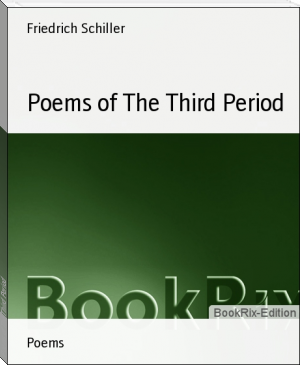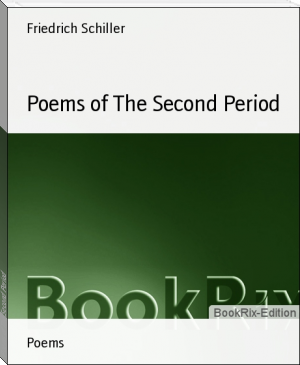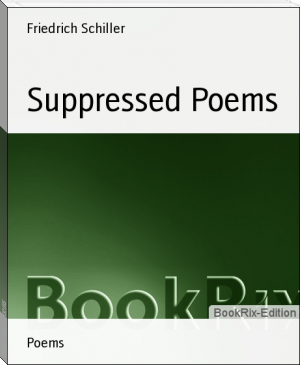Poems of The Third Period - Friedrich Schiller (10 best books of all time .txt) 📗

- Author: Friedrich Schiller
Book online «Poems of The Third Period - Friedrich Schiller (10 best books of all time .txt) 📗». Author Friedrich Schiller
"But soon their courage I restored;
They seized with rage the foe abhorred,
While I against the beast's loins threw
My spear with sturdy arm and true:
But, powerless as a bulrush frail,
It bounded from his coat of mail;
And ere I could repeat the throw,
My horse reeled wildly to and fro
Before his basilisk-like look,
And at his poison-teeming breath, -
Sprang backward, and with terror shook,
While I seemed doomed to certain death."
"Then from my steed I nimbly sprung,
My sharp-edged sword with vigor swung;
Yet all in vain my strokes I plied, -
I could not pierce his rock-like hide.
His tail with fury lashing round,
Sudden he bore me to the ground.
His jaws then opening fearfully,
With angry teeth he struck at me;
But now my dogs, with wrath new-born,
Rushed on his belly with fierce bite,
So that, by dreadful anguish torn,
He howling stood before my sight."
"And ere he from their teeth was free,
I raised myself up hastily,
The weak place of the foe explored,
And in his entrails plunged my sword,
Sinking it even to the hilt;
Black gushing forth, his blood was spilt.
Down sank he, burying in his fall
Me with his body's giant ball,
So that my senses quickly fled;
And when I woke with strength renewed,
The dragon in his blood lay dead,
While round me grouped my squires all stood."
The joyous shouts, so long suppressed,
Now burst from every hearer's breast,
Soon as the knight these words had spoken;
And ten times 'gainst the high vault broken,
The sound of mingled voices rang,
Re-echoing back with hollow clang.
The Order's sons demand, in haste,
That with a crown his brow be graced,
And gratefully in triumph now
The mob the youth would bear along
When, lo! the master knit his brow,
And called for silence 'mongst the throng.
And said, "The dragon that this land
Laid waste, thou slew'st with daring hand;
Although the people's idol thou,
The Order's foe I deem thee now.
Thy breast has to a fiend more base
Than e'en this dragon given place.
The serpent that the heart most stings,
And hatred and destruction brings,
That spirit is, which stubborn lies,
And impiously cast off the rein,
Despising order's sacred ties;
'Tis that destroys the world amain."
"The Mameluke makes of courage boast,
Obedience decks the Christian most;
For where our great and blessed Lord
As a mere servant walked abroad,
The fathers, on that holy ground,
This famous Order chose to found,
That arduous duty to fulfil
To overcome one's own self-will!
'Twas idle glory moved thee there:
So take thee hence from out my sight!
For who the Lord's yoke cannot bear,
To wear his cross can have no right."
A furious shout now raise the crowd,
The place is filled with outcries loud;
The brethren all for pardon cry;
The youth in silence droops his eye -
Mutely his garment from him throws,
Kisses the master's hand, and - goes.
But he pursues him with his gaze,
Recalls him lovingly, and says:
"Let me embrace thee now, my son!
The harder fight is gained by thee.
Take, then, this cross - the guerdon won
By self-subdued humility."
FEMALE JUDGMENT.
Man frames his judgment on reason; but woman on love founds her verdict; If her judgment loves not, woman already has judged.
FRIDOLIN; OR, THE WALK TO THE IRON FOUNDRY.
A gentle was Fridolin,
And he his mistress dear,
Savern's fair Countess, honored in
All truth and godly fear.
She was so meek, and, ah! so good!
Yet each wish of her wayward mood,
He would have studied to fulfil,
To please his God, with earnest will.
From the first hour when daylight shone
Till rang the vesper-chime,
He lived but for her will alone,
And deemed e'en that scarce time.
And if she said, "Less anxious be!"
His eye then glistened tearfully.
Thinking that he in duty failed,
And so before no toil he quailed.
And so, before her serving train,
The Countess loved to raise him;
While her fair mouth, in endless strain,
Was ever wont to praise him.
She never held him as her slave,
Her heart a child's rights to him gave;
Her clear eye hung in fond delight
Upon his well-formed features bright.
Soon in the huntsman Robert's breast
Was poisonous anger fired;
His black soul, long by lust possessed,
With malice was inspired;
He sought the Count, whom, quick in deed,
A traitor might with ease mislead,
As once from hunting home they rode,
And in his heart suspicion sowed.
"Happy art thou, great Count, in truth,"
Thus cunningly he spoke;
"For ne'er mistrust's envenomed tooth
Thy golden slumbers broke;
A noble wife thy love rewards,
And modesty her person guards.
The tempter will be able ne'er
Her true fidelity to snare."
A gloomy scowl the Count's eye filled:
"What's this thou say'st to me?
Shall I on woman's virtue build,
Inconstant as the sea?
The flatterer's mouth with ease may lure;
My trust is placed on ground more sure.
No one, methinks, dare ever burn
To tempt the wife of Count Savern."
The other spoke: "Thou sayest it well,
The fool deserves thy scorn
Who ventures on such thoughts to dwell,
A mere retainer born, -
Who to the lady he obeys
Fears not his wishes' lust to raise." -
"What!" tremblingly the Count began,
"Dost speak, then, of a living man?" -
"Is, then, the thing, to all revealed,
Hid from my master's view?
Yet, since with care from thee concealed,
I'd fain conceal it too" -
"Speak quickly, villain! speak or die!"
Exclaimed the other fearfully.
"Who dares to look on Cunigond?"
"'Tis the fair page that is so fond."
"He's not ill-shaped in form, I wot,"
He craftily went on;
The Count meanwhile felt cold and hot,
By turns in every bone.
"Is't possible thou seest not, sir,
How he has eyes for none but her?
At table ne'er attends to thee,
But sighs behind her ceaselessly?"
"Behold the rhymes that from him came
His passion to confess" -
"Confess!" - "And for an answering flame, -
The impious knave! - to press.
My gracious lady, soft and meek,
Through pity, doubtless, feared to speak;
That it has 'scaped me, sore I rue;
What, lord, canst thou to help it do?"
Into the neighboring wood then rode
The Count, inflamed with wrath,
Where, in his iron foundry, glowed
The ore, and bubbled forth.
The workmen here, with busy hand,
The fire both late and early fanned.
The sparks fly out, the bellows ply,
As if the rock to liquefy.
The fire and water's might twofold
Are here united found;
The mill-wheel, by the flood seized hold,
Is whirling round and round;
The works are clattering night and day,
With measured stroke the hammers play,
And, yielding to the mighty blows,
The very iron plastic grows.
Then to two workmen beckons he,
And speaks thus in his ire;
"The first who's hither sent by me
Thus of ye to inquire
'Have ye obeyed my lord's word well?'
Him cast ye into yonder hell,
That into ashes he may fly,
And ne'er again torment mine eye!"
The inhuman pair were overjoyed,
With devilish glee possessed
For as the iron, feeling void,
Their heart was in their breast,
And brisker with the bellows' blast,
The foundry's womb now heat they fast,
And with a murderous mind prepare
To offer up the victim there.
Then Robert to his comrade spake,
With false hypocrisy:
"Up, comrade, up! no tarrying make!
Our lord has need of thee."
The lord to Fridolin then said:
"The pathway toward the foundry tread,
And of the workmen there inquire,
If they have done their lord's desire."
The other
They seized with rage the foe abhorred,
While I against the beast's loins threw
My spear with sturdy arm and true:
But, powerless as a bulrush frail,
It bounded from his coat of mail;
And ere I could repeat the throw,
My horse reeled wildly to and fro
Before his basilisk-like look,
And at his poison-teeming breath, -
Sprang backward, and with terror shook,
While I seemed doomed to certain death."
"Then from my steed I nimbly sprung,
My sharp-edged sword with vigor swung;
Yet all in vain my strokes I plied, -
I could not pierce his rock-like hide.
His tail with fury lashing round,
Sudden he bore me to the ground.
His jaws then opening fearfully,
With angry teeth he struck at me;
But now my dogs, with wrath new-born,
Rushed on his belly with fierce bite,
So that, by dreadful anguish torn,
He howling stood before my sight."
"And ere he from their teeth was free,
I raised myself up hastily,
The weak place of the foe explored,
And in his entrails plunged my sword,
Sinking it even to the hilt;
Black gushing forth, his blood was spilt.
Down sank he, burying in his fall
Me with his body's giant ball,
So that my senses quickly fled;
And when I woke with strength renewed,
The dragon in his blood lay dead,
While round me grouped my squires all stood."
The joyous shouts, so long suppressed,
Now burst from every hearer's breast,
Soon as the knight these words had spoken;
And ten times 'gainst the high vault broken,
The sound of mingled voices rang,
Re-echoing back with hollow clang.
The Order's sons demand, in haste,
That with a crown his brow be graced,
And gratefully in triumph now
The mob the youth would bear along
When, lo! the master knit his brow,
And called for silence 'mongst the throng.
And said, "The dragon that this land
Laid waste, thou slew'st with daring hand;
Although the people's idol thou,
The Order's foe I deem thee now.
Thy breast has to a fiend more base
Than e'en this dragon given place.
The serpent that the heart most stings,
And hatred and destruction brings,
That spirit is, which stubborn lies,
And impiously cast off the rein,
Despising order's sacred ties;
'Tis that destroys the world amain."
"The Mameluke makes of courage boast,
Obedience decks the Christian most;
For where our great and blessed Lord
As a mere servant walked abroad,
The fathers, on that holy ground,
This famous Order chose to found,
That arduous duty to fulfil
To overcome one's own self-will!
'Twas idle glory moved thee there:
So take thee hence from out my sight!
For who the Lord's yoke cannot bear,
To wear his cross can have no right."
A furious shout now raise the crowd,
The place is filled with outcries loud;
The brethren all for pardon cry;
The youth in silence droops his eye -
Mutely his garment from him throws,
Kisses the master's hand, and - goes.
But he pursues him with his gaze,
Recalls him lovingly, and says:
"Let me embrace thee now, my son!
The harder fight is gained by thee.
Take, then, this cross - the guerdon won
By self-subdued humility."
FEMALE JUDGMENT.
Man frames his judgment on reason; but woman on love founds her verdict; If her judgment loves not, woman already has judged.
FRIDOLIN; OR, THE WALK TO THE IRON FOUNDRY.
A gentle was Fridolin,
And he his mistress dear,
Savern's fair Countess, honored in
All truth and godly fear.
She was so meek, and, ah! so good!
Yet each wish of her wayward mood,
He would have studied to fulfil,
To please his God, with earnest will.
From the first hour when daylight shone
Till rang the vesper-chime,
He lived but for her will alone,
And deemed e'en that scarce time.
And if she said, "Less anxious be!"
His eye then glistened tearfully.
Thinking that he in duty failed,
And so before no toil he quailed.
And so, before her serving train,
The Countess loved to raise him;
While her fair mouth, in endless strain,
Was ever wont to praise him.
She never held him as her slave,
Her heart a child's rights to him gave;
Her clear eye hung in fond delight
Upon his well-formed features bright.
Soon in the huntsman Robert's breast
Was poisonous anger fired;
His black soul, long by lust possessed,
With malice was inspired;
He sought the Count, whom, quick in deed,
A traitor might with ease mislead,
As once from hunting home they rode,
And in his heart suspicion sowed.
"Happy art thou, great Count, in truth,"
Thus cunningly he spoke;
"For ne'er mistrust's envenomed tooth
Thy golden slumbers broke;
A noble wife thy love rewards,
And modesty her person guards.
The tempter will be able ne'er
Her true fidelity to snare."
A gloomy scowl the Count's eye filled:
"What's this thou say'st to me?
Shall I on woman's virtue build,
Inconstant as the sea?
The flatterer's mouth with ease may lure;
My trust is placed on ground more sure.
No one, methinks, dare ever burn
To tempt the wife of Count Savern."
The other spoke: "Thou sayest it well,
The fool deserves thy scorn
Who ventures on such thoughts to dwell,
A mere retainer born, -
Who to the lady he obeys
Fears not his wishes' lust to raise." -
"What!" tremblingly the Count began,
"Dost speak, then, of a living man?" -
"Is, then, the thing, to all revealed,
Hid from my master's view?
Yet, since with care from thee concealed,
I'd fain conceal it too" -
"Speak quickly, villain! speak or die!"
Exclaimed the other fearfully.
"Who dares to look on Cunigond?"
"'Tis the fair page that is so fond."
"He's not ill-shaped in form, I wot,"
He craftily went on;
The Count meanwhile felt cold and hot,
By turns in every bone.
"Is't possible thou seest not, sir,
How he has eyes for none but her?
At table ne'er attends to thee,
But sighs behind her ceaselessly?"
"Behold the rhymes that from him came
His passion to confess" -
"Confess!" - "And for an answering flame, -
The impious knave! - to press.
My gracious lady, soft and meek,
Through pity, doubtless, feared to speak;
That it has 'scaped me, sore I rue;
What, lord, canst thou to help it do?"
Into the neighboring wood then rode
The Count, inflamed with wrath,
Where, in his iron foundry, glowed
The ore, and bubbled forth.
The workmen here, with busy hand,
The fire both late and early fanned.
The sparks fly out, the bellows ply,
As if the rock to liquefy.
The fire and water's might twofold
Are here united found;
The mill-wheel, by the flood seized hold,
Is whirling round and round;
The works are clattering night and day,
With measured stroke the hammers play,
And, yielding to the mighty blows,
The very iron plastic grows.
Then to two workmen beckons he,
And speaks thus in his ire;
"The first who's hither sent by me
Thus of ye to inquire
'Have ye obeyed my lord's word well?'
Him cast ye into yonder hell,
That into ashes he may fly,
And ne'er again torment mine eye!"
The inhuman pair were overjoyed,
With devilish glee possessed
For as the iron, feeling void,
Their heart was in their breast,
And brisker with the bellows' blast,
The foundry's womb now heat they fast,
And with a murderous mind prepare
To offer up the victim there.
Then Robert to his comrade spake,
With false hypocrisy:
"Up, comrade, up! no tarrying make!
Our lord has need of thee."
The lord to Fridolin then said:
"The pathway toward the foundry tread,
And of the workmen there inquire,
If they have done their lord's desire."
The other
Free e-book «Poems of The Third Period - Friedrich Schiller (10 best books of all time .txt) 📗» - read online now
Similar e-books:





Comments (0)